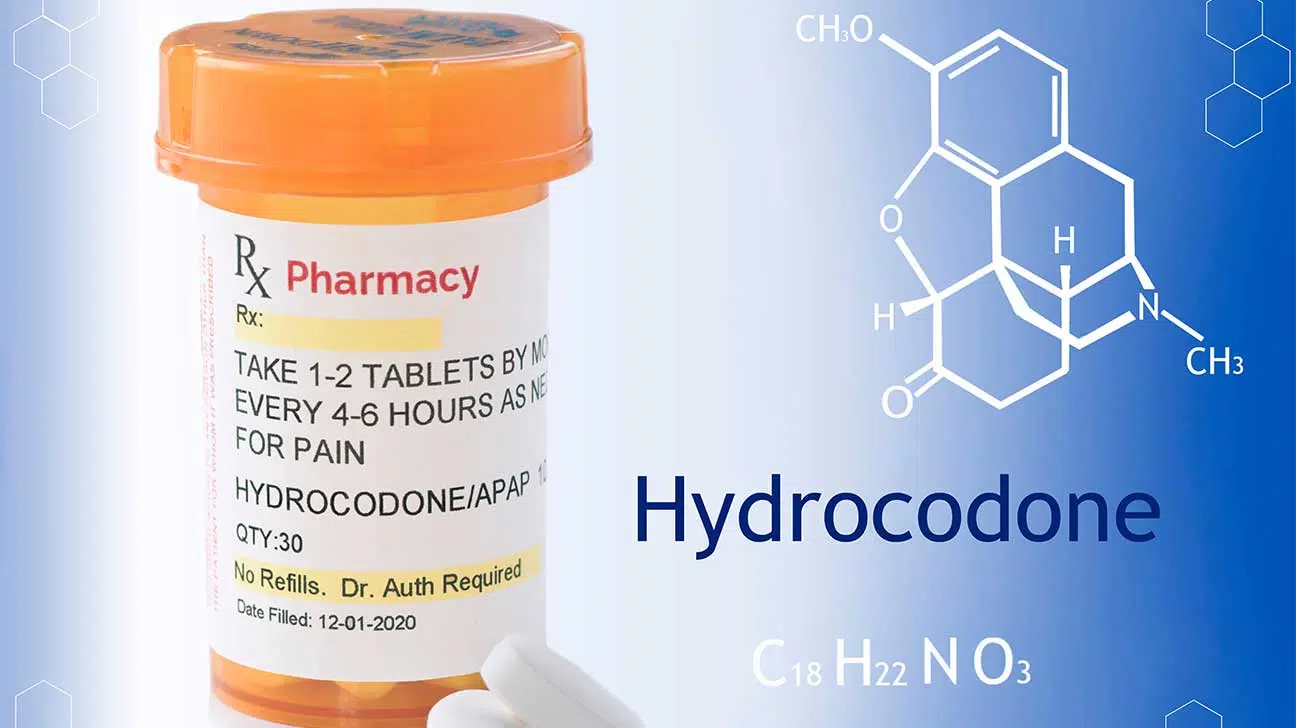
Hydrocodone is found in dozens of brand name drugs. One of the most recognizable is Vicodin, which combines hydrocodone with acetaminophen.
Hydrocodone is an opioid drug with similar pharmacology components to oxycodone, hydromorphone, codeine, and fentanyl.
All of these drugs bind to your opioid receptors and have the ability to create a tolerance in the person using the medications.
While opioid tolerance is not necessarily dangerous, it can promote drug abuse.
Factors That Influence Vicodin Tolerance
There are many factors that influence Vicodin tolerance, including your physical body and your history of chronic opioid use.
Chronic Pain
Narcotic pain medications are typically reserved for severe or chronic pain that does not respond to non-opioid painkillers.
If your pain is omnipresent, then you may struggle with tolerance simply due to the daily need for severe pain relief.
Genetics
Research shows that some people may be more vulnerable to tolerance and addiction. Genetic factors may contribute to this correlation.
If you have a family history of substance abuse, you should discuss it with your healthcare provider prior to using opioid medications.
Side Effects Of Hydrocodone Tolerance
As you develop hydrocodone tolerance, the same low dose will no longer provide the desired effect. At this point, you should make your doctor aware of your situation.
Ideally, your tolerance will be treated. Prescribing a higher dose due to tolerance puts you at risk for a number of health issues related to the effects of opioids.
Respiratory Depression
Opiates suppress certain responses in your central nervous system.
One effect is that your respiratory rate may slow. If you are using a high dose of hydrocodone, your respiratory rate may drop dangerously low.
When your respiratory rate drops too low, this is a side effect of opioid overdose. The lack of adequate oxygen will deprive your brain and may cause permanent brain damage and/or death.
Physical Dependence
Your brain is constantly adapting to its environment. That includes the environment created by opioid drug use.
If you are regularly using hydrocodone for more than a couple weeks, there is a risk that you will develop a physical dependence to opioids.
Physical dependence describes your brain’s reliance on drugs to maintain relatively normal function. In this situation, your brain has adjusted its behavior to balance the effects of the drugs.
As a result, your normal dose is less effective, and you may begin to experience opioid withdrawal symptoms when you aren’t actively using.
Health Risks Of Opioid Tolerance
Opioid tolerance is only dangerous if you are not proactive. If you notice that your prescribed dose is no longer effective, you need to talk to your doctor.
Simply increasing the amount of hydrocodone you use is a short-lived solution that will only make the problem worse.
Without intervention, tolerance can promote opioid addiction and increase the risk of overdose death.
Opioid Overdose
Opioid overdoses are largely related to severe respiratory depression. Your breathing stops or slows to a point where your body is not physically getting enough oxygen to survive.
The lack of oxygenated blood is capable of damaging any number of organ systems, but your brain is most directly affected.
Without immediate medical care, an opioid overdose may result in coma, irreversible brain damage, or death.
If you are aware that you or a loved one has a substance use disorder involving opioids, contact your local harm reduction program.
Most can provide you with an emergency kit that includes Narcan, the brand name of naloxone, to help reverse opioid overdose while help arrives.
Toxicity
Opioid toxicity is a formal diagnosis usually determined after someone is brought in due to an overdose.
Opioid toxicity has a number of tells. Respiratory depression is the greatest sign, but the healthcare staff will also look for slowed speech, pinpoint pupils, and abdominal cramps.
When opioid toxicity is diagnosed, the emergency healthcare team will rush to secure the airway. Naloxone and other drugs may be administered to help stabilize you or your loved one.
Can You Reverse A Tolerance To Opioids Like Hydrocodone?
Research by the FDA and other government agencies shows that people who become addicted to opiates often start using prescription drugs for legitimate reasons.
This discovery increased interest in ways that tolerance could be reversed. In the case of hydrocodone, an acute dose of diazepam has proven effective in reversing tolerance.
Treatment Options For Hydrocodone Addiction
There are treatment programs available that can help you get started with your hydrocodone recovery.
If you are ready to build a life without opioid use, start by contacting a program that offers medically assisted detox.
These programs use medications like benzodiazepines, methadone, and buprenorphine to manage your opiate withdrawal by reducing symptoms and tapering use.
Once you’re through detox, you can choose inpatient or outpatient addiction treatment. Rehab centers offer various forms of therapy to fit the needs of your opioid use disorder.
Find A Drug Rehab Center Near You
If you’re misusing prescription painkillers, it may be time for you to get help. Don’t wait until an opioid addiction takes over your life.
Call our helpline, and find an addiction recovery program today.
Addiction Resource aims to provide only the most current, accurate information in regards to addiction and addiction treatment, which means we only reference the most credible sources available.
These include peer-reviewed journals, government entities and academic institutions, and leaders in addiction healthcare and advocacy. Learn more about how we safeguard our content by viewing our editorial policy.
- Centers for Disease Control and Prevention — Drug Overdose Deaths in the U.S. Top 100,000 Annually
https://www.ncbi.nlm.nih.gov/books/NBK431077/ - Elsevier — Reversal of Oxycodone and Hydrocodone Tolerance by Diazepam
https://www.sciencedirect.com/science/article/abs/pii/S0006899317303530?via%3Dihub - U.S. National Library of Medicine: MedlinePlus — Hydrocodone
https://medlineplus.gov/druginfo/meds/a614045.html#:~:text=Hydrocodone%20is%20used%20to%20relieve,with%20other%20medications%20or%20treatments. - National Institutes of Health — Opioid Toxicity
https://www.ncbi.nlm.nih.gov/books/NBK431077/ - U.S. Department of Health and Human Services — Prevent Opioid Abuse
https://www.hhs.gov/opioids/prevention/index.html


